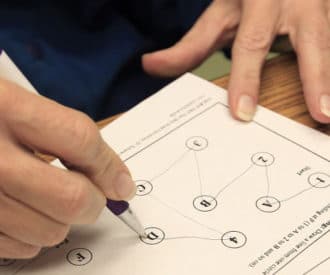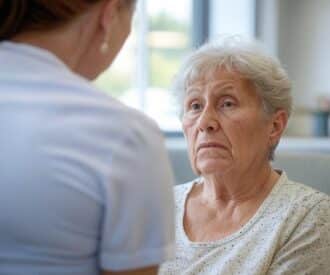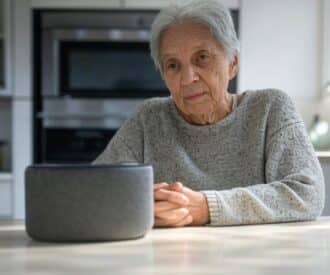
When his father was diagnosed with Alzheimer's disease, the award-winning MSNBC Anchor Richard Lui decided to set aside his growing career to care for family. In this excerpt from his book “Enough About Me: The Unexpected Power of Selflessness,” Richard shares his family’s experience caring for his father with Alzheimer’s.
Chapter 7: Personal Relationships
My mother was the primary caregiver for my father at home for four years as his Alzheimer’s increased in severity. She remained positive throughout. When I spoke to her on the phone, she was her usual congenial, calm self, despite the demands and stresses of taking care of my father – and it was stressful. At one point, he was getting up a dozen times each night to take a shower. He tried to leave the house every fifteen minutes, despite the doors being locked. He wanted to eat all the time. Mom hid the food and moved the refrigerator into the locked garage so he couldn’t get to it. Even then, he tried to open canned food with a knife.
The camera also showed how chaotic my mother’s life was, constantly trying to chase Dad down. Trying to keep both herself and him safe from his behaviors. Trying to cook meals he’d grab before she was even done preparing them.
On the phone or when I was visiting, she was calm. No screams. No expressions of resentment. She had never complained, never asked for help from us directly. Everything she had done her entire life was for the benefit of our family. When the family budget was tight, she would buy me the new pair of jeans I needed instead of buying anything for herself. But this was too much. My father’s disease demanded too much of her. And she still kept on giving. She never let us know how stressed she felt. That’s why her screams, her cries for help, surprised us.
The day my father was moved to a care facility, I saw how conflicted my mom was. Her faith and her values were leading her to resist letting him go. She thought that caring for him herself was the best way to help him navigate the disease. But the fact that Dad needed to move to a place where he could get the additional care he needed wasn’t an indictment of her care for him. The disease was too big for this eighty-year-old retired teacher. It had deceived her into giving up her life too.
There are limits to selflessness. We cannot and should not always be selfless. (In fact, if you’re acting selfless for more than four hours or experience dizziness, call your doctor and don’t operate any heavy machinery.) Most often, this “too selfless” point manifests itself in our relationships – with our spouse, partner, family, and close friends. When the needs of those we love are extensive, trying to meet their needs can push us to the point where acting selflessly is no longer productive and healthy. Though most of us have deficits in selflessness, there are also times when too much of a good thing does more harm than good.
Recommended for you:
- 5 Tips for Dealing with Caregiver Guilt in Dementia Care
- 4 Ways to Overcome Caregiver Loneliness in Dementia Care
- 3 Stages of Dementia: What to Expect as the Disease Progresses
Guest contributor: Veteran journalist Richard Lui has more than 30 years in television, film, technology and business. Currently at MSNBC and previously with CNN Worldwide, he is the first Asian American man to anchor a daily national cable news program, and a team DuPont and Peabody winner. In 2021, he made his directorial debut with the award-winning feature documentary Sky Blossom, about young family caregivers. In addition to journalism, Richard’s 15-year business career involves a fintech patent and launching six tech brands over three business cycles. He has lived, worked, and volunteered on every continent. Richard is a Celebrity Champion for the Alzheimer’s Association, Caregiving Champion for AARP.
This article wasn’t sponsored and doesn’t contain affiliate links. For more information, see How We Make Money.
[optin-monster slug=”yxbytm35zhsdfopnw7qk”][optin-monster slug=”jvhyplxmb4umsjazxecn”]





This article points out the tremendous toll that Alzheimer’s plays on everyone. As a caregiver myself, until my mom passed away from Alzheimer’s, I can empathize with Mr. Lui’s mom’s frustrations. I even wrote a book about our trials and tribulations called, “My Mother Has Alzheimer’s and My Dog Has Tapeworms: A Careigiver’s Tale.” I had to remind myslef often, that my mom didn’t expect to get Alzheimer’s, and she certainly wasn’t aware of the toll that it would take on everyone. I tried to manintain a sense of steadiness and to find a sense of humor, amidst the chaos.
Thank you for sharing your experiences!